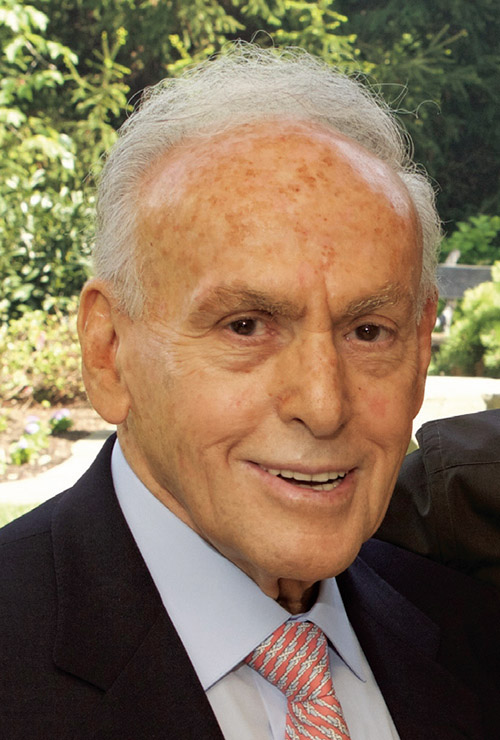



Elizabeth—The sanctuary of the Elmora Avenue Shul was tangibly somber as Harav Elazar Mayer Teitz, shlita, approached the microphone to address an attendance exceeding one thousand people, with words of comfort and consolation to the family of Mr. Joseph Wilf, of blessed memory. The rav and rebbetzin came from Israel to be with the family and to officiate the service. Acknowledging the rabbanim and numerous dignitaries, Rav Teitz expounded on Wilf’s pioneering presence in the community by initiating and organizing a Holocaust survivors group, later renamed by Rabbi Jonathan Schwartz of Congregation Adath Israel as “the thrivers.” Rav Teitz noted Wilf was a “true builder”: a builder of people, of important ideals and of places, affixing his name to buildings for education and to communal structures that serve the important needs of humanity locally and throughout the world, especially in Israel. Wilf represented the paradigm of honoring parents, and endowed his wife, Suzie, a matriarch in her own right, and their children, grandchildren and great-grandchildren with a lifetime legacy of good deeds.
Rabbi Samuel Klibanoff, of Etz Chaim in Livingston, spoke of Wilf’s visionary genius, comparing him to Yosef haTzadik in Egypt, a “dreamer” unparalleled in vision and leadership. More precisely, the Wilf Family Foundation established 50 years ago leaves an “unbelievable legacy” of defying the “naysayers,” and repairing the wounds of history instead of dwelling on them. Wilf left Europe’s atmosphere of death and destruction to create a legacy of repair, not defined by obstacles, but focused on optimism, family and a future for Israel. He was truly a “gentle giant” who advocated for humankind.
Rabbi Schwartz continued the theme of building, depicting Wilf as a “builder without boundaries or fanfare.” Wilf knew how to create enduring partnerships that built communities and people, and injected them with a formula of success for the future. He cared not just about what he could “get out of his employees, but also what he could put into them,” helping to create jobs and neighborhoods and building economies. Schwartz referred to Joseph Wilf as a master builder who epitomized the quote from Isaiah Chapter 54, raising one’s children as builders [bonim], not just children [banim].
Zygi Wilf, the oldest son, traced his father’s origins in Yaroslav, Poland, in 1925, to being deported to a Siberian work camp northeast of Afghanistan, surviving exposure to malaria and typhus. He met and married Suzie, and they forged their way through American-occupied Germany, out of Europe to Birmingham, AL. Later, he was able to bring the rest of his family to the U.S. In 1954, Wilf began a home-building business with his brother Harry, o”bm. They soon came to the Elizabeth/Hillside area where Wilf created a welcoming environment for other survivors. There he forged his dream for a new way of life for Jews in America.
Wilf’s love of football was a major part of the American way. He remarked one season about his son’s lament over the losing record of their beloved New York Giants: “It could be worse; we could be the owners!” That prophetic remark was realized 12 years ago when Zygi and his brother, Mark, purchased the NFL franchise Minnesota Vikings—with their father’s blessing and moral support. Zygi became emotional as he described his father as “always being on my side,” expressing pride and joy in his accomplishments, encouraging him to perpetuate the legacy of giving back, and engendering joy within the family. Zygi also referenced his father’s role in the funding and building of Yad Vashem.
Mark, the younger son, noted how much the family appreciated the outpouring of community support over these past difficult days and weeks, especially acknowledging the kindness of his father’s caregivers and medical consultants. Breaking the tension of grief and sadness, Mark digressed to his parents’ brief time in Birmingham, mentioning the prevailing practice of racial segregation. Joe Wilf, in a humor byte of his own, would question, “What kind of transportation business would abandon a full line of customers prepared to pay, and drive away with a bus full of empty seats they could have sold!”
Mark also described his father’s little-known involvement in assembling a group of philanthropists that engineered the monumental Operation Exodus, airlifting thousands of Jews from communist Russia to freedom in Israel. He expressed that his father’s passing is truly the window closing on an era of “a miraculous builder, in the shadow of unbelievable history and destruction…,” words tearfully echoed by many following the service. “He is an irreplaceable gentle giant; a truly revered and respected community leader; he was our North Star.”
All seven grandchildren offered brief and eloquent remarks, their words carrying the same universal theme: Wilf was a wonderful role model, positive and encouraging, advocating the dangers of hate and the importance of perseverance in the face of adversity—all of which Wilf taught not with mere words, but by living example.
The service concluded with the sobering kel maleh rachamim, offered by Ira Heller and felt to the core by everyone present, as if one soul was speaking to another. The memory of Yosef ben Yehoshua Zachariah, z”l, a man who made a difference to everyone he knew and to the world, will live on through all those whose lives he touched.









